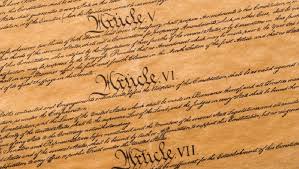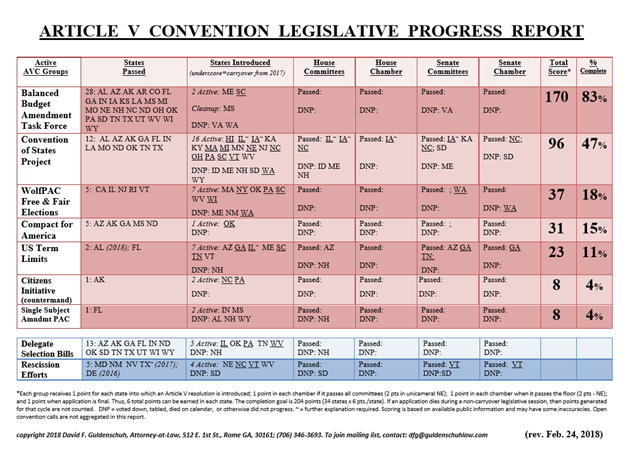
Vickie Deppe – February 2023
Our friend David Guldenschuh has prepared a new Legislative Progress Report to kick off the 2023 session. Detailed information on current legislation follows.

Connecticut Representative Kathy Kennedy has filed an application for a general convention. HJ 23 has been referred to the Joint Committee on Government Affairs and Elections. The last application for a general convention was passed in 1980.
Delegate selection and oversight legislation has been filed in Arizona Iowa, Kansas, Missouri, Mississippi, Montana, Nebraska, New Hampshire, Oklahoma, South Carolina, the Texas House, the Texas Senate, and the West Virginia Senate. Notably, the Arizona, Missouri, and Nebraska renditions require bipartisan participation in the selection of commissioners, and we encourage other states to follow suit. If your state doesn’t already have a DSO in place or you think it could use a refresh, you may view the Academy 3.0 Delegate Selection and Oversight Sessions here and here, and access Path To Reform’s library of DSO legislation here.
The Convention of States Project application has been filed in Illinois, New Hampshire, New York, and Wyoming as well as the Virginia House and Senate. In Nebraska, Senator Steve Halloran has filed LR 31 to remove the sunset clause contained in last session’s rendition. In Montana, SJ 2 passed in the Business, Labor, and Economic Affairs Committee. Two renditions of the CoSP application have been filed in Iowa. SJR 1 follows the boilerplate language, and SJR 2 adds verbiage requesting that Congress propose amendments of its own. Both have been assigned to the Senate State Government Committee. The CoSP application has been carried over in the New Jersey Assembly and Senate.
Fiscal constraints applications have been filed in Arizona and South Carolina. Both await committee hearings.
Term limits applications have been filed in Arizona, the Connecticut House and Senate, Kansas, Kentucky, New Hampshire, South Dakota, Tennessee, and Utah. The Arizona rendition has bipartisan support.
The Wolf-PAC Free & Fair Elections application has been filed in Oregon and Washington.
In New Jersey, SCR 81, an application for an Article V Convention to propose a balanced budget amendment, impose term limits on members of Congress and the Supreme Court, and change the allocation of Electoral College votes has been carried over from the previous session.
The next meeting of the Phoenix Correspondence Commission is scheduled for March 10 at 9 a.m. PST. The PCC is an official channel for the states to communicate with each other and with Congress regarding Article V matters. If you would like to represent your state at the PCC, please contact Bruce Lee.
Media
With the opening of the new legislative session comes the expected flurry of Article V legislation and attendant media coverage, both pro and con. David Walker, Comptroller General during the Clinton and Bush administrations, penned a piece for the Washington Times urging fiscal restraint on the part of the federal government. Legislators and other state officials who are interested in learning how their state can join in the mandamus suit referenced therein may contact Walker here.
In Missoula, testimony by Rick Santorum in support of the Convention of States Project application (SJR 2) received coverage by The Daily Montanan and The Independent Record.
At The Election Law Blog, UCLA Professor of Law and Political Science Rick Hasen wonders “Will the Republican Rules Package in the House Make Calling a Constitutional Convention More Likely?” Our friend Sam Fieldman, National Counsel for Wolf-PAC, points out that the current rule differs by just one word from the one approved by the previous Congress, and has remained intact after both Republican to Democratic and Democratic to Republican transitions. Our answer to Professor Hasen’s question is this: If a Convention is more likely now than it was two years ago, it’s thanks to the tireless efforts of Article V advocates around the country and across the political spectrum, not a result of the new rules package.
Business Insider strikes again, this time with a tortured attempt to stoke fear by linking the Article V movement to the far-right and former President Donald Trump…an Article V opponent, incidentally. One must wonder if the author knows that Democratic interest in Article V surged in the wake of Trump’s 2016 victory? He eventually gets around to admitting that Article V isn’t just a conservative phenomenon: Wolf-PAC was founded by progressive podcaster Cenk Uygur and is supported largely by left-leaning activists. Ironically, he criticizes Convention of States Project’s expenditures by its super PAC in support of pro-Article V state legislative candidates…the very thing Wolf-PAC is working for an Article V Convention to stop.
